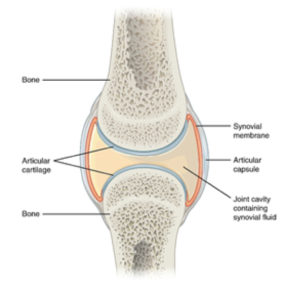Horse Health, Natural Pet Health
Joint Health in Horses
Whether your horse jumps, piaffes or hacks, their joints keep them moving. And healthy joints lie at the heart of a sound horse that is able to compete and remain active well into old age. In this post we look at what makes up a healthy joint and what you can do to help ensure your horse’s joints remain in excellent shape.
Types of joints in horses
There are three types of joints within your horses’ body – fibrous or ‘fixed’ joints, cartilaginous and synovial. The synovial joints are the ones that provide movement and horses have 18 of them spread throughout the skeleton. Providing these joints with the right nutrition and care throughout your horses’ life is essential to maintain joint function and performance and minimize injury and a good place to start is knowing what the joint needs to remain healthy.
So, what makes a healthy joint?

Every synovial joint in your horses’ body contains two bony ends. These ends are covered by articular cartilage – which is a type of connective tissue – and encased within a joint capsule. The inner layer of the joint capsule (called the ‘synovial membrane’) secretes synovial fluid which provides cushioning and prevents friction between the joint structures, and the outer layer helps to support and stabilise the joint. The synovial fluid within the joint also nourishes the joint cartilage.
Cartilage provides protection and shock absorption for joints, but slow wearing over the years can cause it to break down and this is when inflammation, stiffness and pain can start to occur. It’s important to realize that the joint should be thought of as a whole organ, with key relationships between cartilage, bone and synovial fluid, where the synovial fluid supplies the vital nutrients for the joint to remain healthy and functioning well.
Synovial fluid contains a combination of different compounds, all of which are integral to joint health. A major component is hyaluronic acid, which is a type of glycosaminoglycan (GAG) made up of a carbohydrate and attached to a protein backbone. Hyaluronic acid together with a type of protein called lubricin helps to give synovial fluid its viscosity.
Hyaluronic acid is also present in articular cartilage, which contains a matrix of collagen, proteoglycans and water. Proteoglycans help the cartilage become elastic and strong and are made up of chains of GAGs and incorporate chondroitin and keratin sulphate.
Maintenance of these joint constituents is essential for healthy joints, and healthier joints are less susceptible to stress, so it’s important to ensure you support them with the right care and management, which includes:
Providing a balanced diet
One of the most important nutrients for joints is glucose, which is normally abundant in the horses’ diet from grass and hay. Glucose provides the basis for building GAGs and proteoglycans. Protein is needed for proteoglycans and collagen, so ensuring your horse is getting a good supply of all their essential amino acids will help build the protein needed for good joint integrity. Essential amino acids can be provided through feeding a nutritious balancer, or from a suitable complete feed fed at the recommended levels, along with good quality forage.
Joints also require certain micronutrients to provide the basis to maintain and support good joint health and integrity. Calcium and phosphorus help to contribute to the joints’ mineral pool and are key constituents of bone, but they need to be supplied in the diet at the correct ratio of 2:1 (calcium to phosphorus) to ensure bones stay strong and healthy. Strong, healthy bones mean less stress on joints and healthier, well-functioning joints. Other essential minerals include copper, zinc and sulphur which are all important in the formation and defence of cartilage. Important vitamins for joint and bone health include Vitamin A, D and B Vitamins. Providing a forage rich diet with a high specification balancer or correct levels of a fortified complete feed, will help supply these key micronutrients at the right balance for optimum joint health.
Additionally, antioxidants such as vitamin C and vitamin E are key for helping to combat damage to joints. Horses generally synthesise their own vitamin C, but those with compromised joint health may not be making enough, and in these cases a vitamin C boost in the form of a supplement can be beneficial. Vitamin E is present in fresh grass but like other essential micronutrients can also be supplied through a good balancer or complete feed.
Manage Weight
Managing your horse’s weight is potentially the most important thing you can do to support healthier joints. Extra weight puts extra pressure on joints, and when there is increased pressure on joints they can be subject to trauma and damage, the effects of which are often irreversible and will lead to pain, stiffness, lameness and arthritis.
Regular use of a weight tape and body condition scoring chart (BCS) is essential to help manage your horse’s weight and ensuring that they stay somewhere between 5 and 6 on a 9-point BCS chart will help maintain a healthy weight which doesn’t compromise joint health.
Provide correct nutritional support
Joint supplements containing glucosamine, chondroitin sulphate and hyaluronic acid are thought to help promote healthier joints because they provide key joint requirements in a readily available form to help promote integrity and reduce inflammation. However, to offer any potential benefits, these nutrients need to get into the synovial fluid itself. Research has shown that quite often they do not reach the joint and as a result they often don’t have any positive effects on joint health. It’s also important to consider that each of these compounds can be made in the horse’s joint, if the basic nutrients are already in place from a balanced diet.
Omega 3 fatty acids are known for their anti-inflammatory properties and a good way of helping to prevent damage to joints is to help control inflammatory processes within the joint. Making sure the diet provides higher levels of omega 3 than omega 6 fatty acids may help control inflammation to support better joint health. Research has shown that omega 3 fatty acids do reach the synovial fluid, so they have good potential. Linseed meal is a great source of omega 3 fatty acids and may be a useful addition to the diet for healthier joints.
Add some Homeopathic help
With key homeopathic ingredients to help provide relief from inflammation, pain and stiffness, EquioPathics Joint Stress will help support stressed joints. EquioPathics Joint Stress promotes temporary relief from joint stiffness and supports recovery from overexertion and muscle tension. Containing no harsh chemicals and with no known side effects, EquioPathics Joint Stress contains no prohibited substances so is safe to use in competition and is a beneficial addition to your horse’s diet to support overall joint function and mobility.
Even with the best care, management and homeopathic support when needed, it goes without saying that joints need movement to best enhance their health. Ensuring your horse has a regular exercise routine is, therefore, essential for maximum joint health, function and integrity – so get out there, enjoy your horse and keep them moving!




